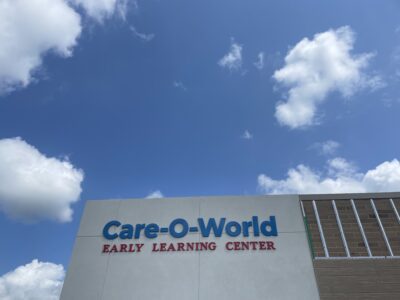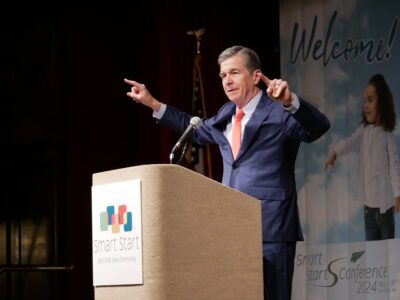
|
|
Democratic leaders from both the House and Senate led a news conference Thursday calling for child care investment in this year’s North Carolina budget.
“Increasingly, adequate access to these critical facilities is getting harder and harder for North Carolina families to find,” said Sen. Dan Blue, D-Wake. “Child care is not just a convenience, it’s a foundational issue.”
Federal funding to stabilize child care will run out at the end of June. Without new funding, about 20% of licensed child care programs are expected to close within a year. Prices also are expected to rise for parents.
Blue and Rep. Robert Reives, D-Chatham, called on legislators in their ongoing short session to extend stabilization grants that child care providers have been receiving through that federal funding.
“That money has been a lifeline for working families and the business community, ensuring that child care centers can continue to function and that working parents can make it work,” Reives said. “But with that money ending now, the state needs to step up and bridge the divide.”
Reives said child care is necessary to allow parents to work and the state’s economy to grow.
“One of North Carolina’s best attributes on the national and global stage is our outstanding workforce,” he said. “It’s a reason we have secured billions of dollars of economic investment and thousands of new jobs. The business community understands the need to have a well-funded child care system, and the working families who rely on it most days of the week surely do.”
Advocates are calling for a one-time $300 million allocation to extend the grants. The legislature’s bipartisan early childhood caucus is advocating a lower number, to last programs until the long session next year.
The legislators at Thursday’s news conference did not specify an amount, but they referenced the early childhood components of Gov. Roy Cooper’s budget proposal, which would extend stabilization funding, eliminate the waitlist for child care subsidy assistance, and create a subsidy floor to help providers in low-income areas.
“At the end of this month, hundreds of my colleagues and I face the devastating possibility of having to close our doors,” said Kim Shaw, owner of A Safe Place Child Enrichment Center in Raleigh, who joined the legislators at the news conference. “We urgently need state resources to pay child care workers what they deserve and to keep our centers open. These children rely on adults to provide for them. And I implore the elected leaders of the North Carolina General Assembly to fully take responsibility.”
Blue and Reives called out another program, the Republican-backed K-12 school voucher expansion, as a distraction from the pressing needs of working families. The Senate passed a bill this month that would allocate more than $400 million to clear the waitlist for the Opportunity Scholarship program, which provides funds to families to attend private schools.
“We need this General Assembly to understand how dire it is that this funding be provided,” Reives said of the child care assistance. “But instead, the focus of this session so far has been to subsidize private school education for millionaires in this building.”
Blue called the voucher expansion’s impact on school districts, as well as insufficient child care, a “double whammy” for rural communities. Public school districts, whose state funding is linked to enrollment, would lose money if students left for private schools.
“By prioritizing vouchers, the General Assembly is exacerbating educational inequality and creating a two-tiered system where wealth determines the quality of education that a child receives,” Blue said. “And this is particularly exacerbated in the rural and poor counties in our state.”










